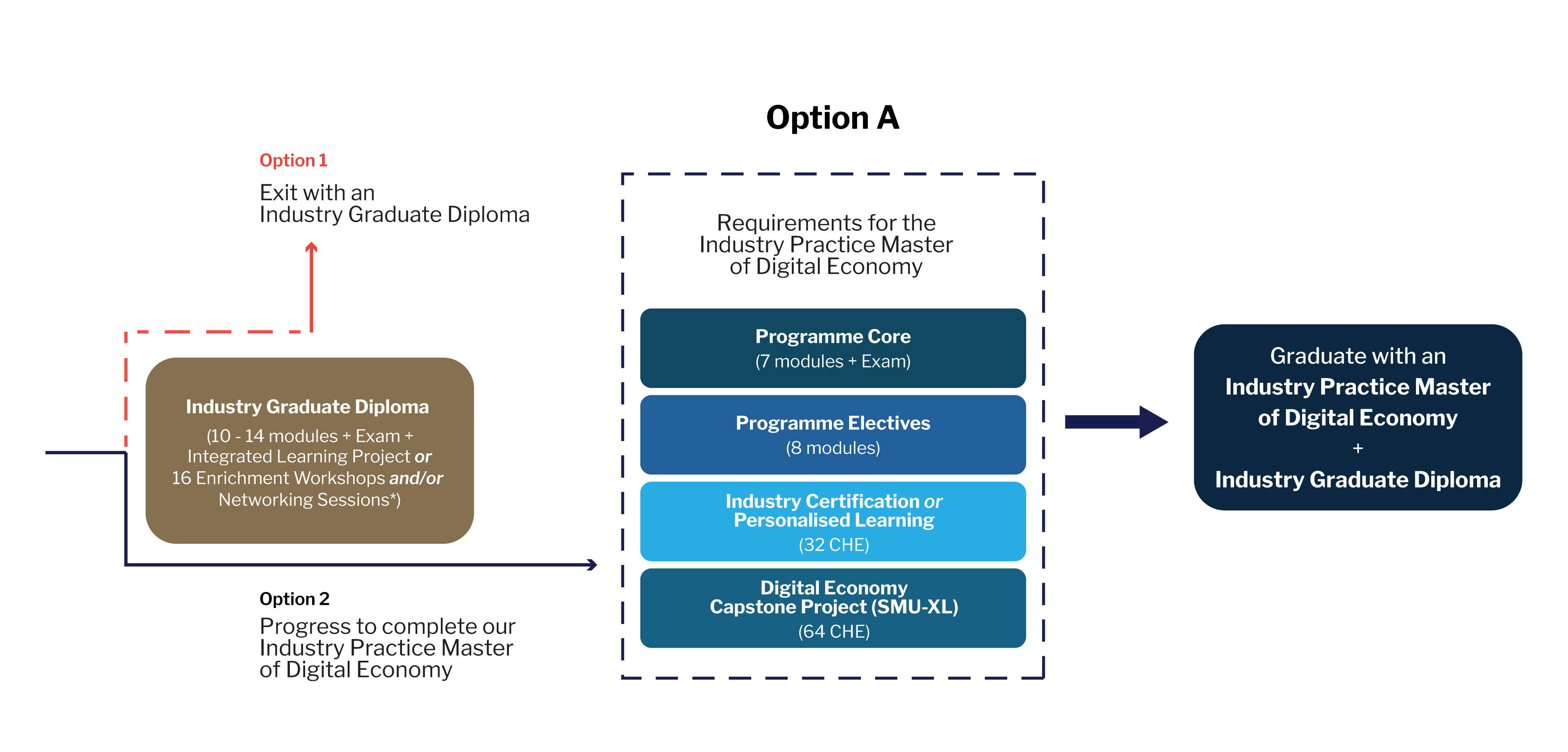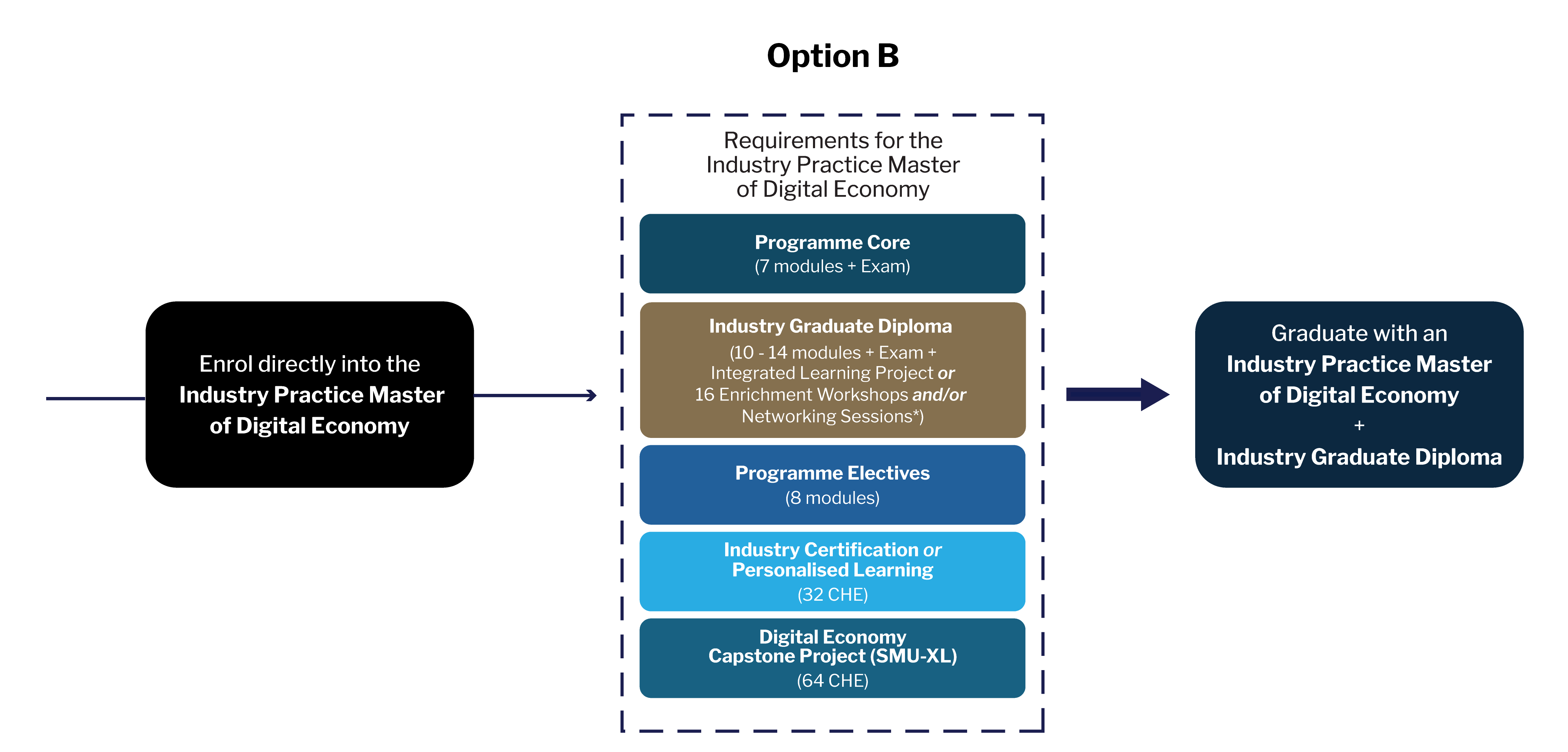Industry Practice Master of Digital Economy
Where Innovation Meets Opportunity


APPLICATIONS ARE OPEN
36 MONTHS DURATION
S$87,527 Tuition Fee*
As low as S$19,331.30 after max. funding. Learn more
Further offset S$4,000 with SkillsFuture Credit (Mid-Career)^
Applications Closes: 26 Jun 2026
Term Begins: Aug 2026
*Fees may vary with module selection
^For eligible Singaporeans aged 40 & above
About The Industry Practice Master of Digital Economy (IPMDE)
The IPMDE is a flexible, stackable postgraduate degree designed for professionals seeking industry-relevant skills. It allows learners to stack modular courses, engage in work-based learning through Digital Economy Capstone Project - SMU-XL, and personalise their learning journey. As part of the pathway, learners can first complete an Industry Graduate Diploma (IGD), which provides a strong foundation before progressing to the IPMDE. With SkillsFuture funding covering up to 90% off skills-based modules, a modular structure for greater accessibility, and competency-based assessments, the IPMDE offers a customisable, career-advancing qualification that fits seamlessly into your professional growth.
Why Pursue The IPMDE?
1. Flexible & Stackable Learning Pathway
Earn your postgraduate qualification at your own pace by stacking modular courses and progressing from an IGD to the IPMDE—tailored for working professionals.
2. Work-Based & Hands-On Learning
Gain real-world experience through Digital Economy Capstone Project - SMU-XL, where you apply your knowledge in industry settings, ensuring practical, job-ready skills that enhance your career.
3. Industry-Aligned & Future-Proof Skills
Stay ahead in the digital economy with a curriculum shaped by industry needs, equipping you with highly sought-after expertise in digital transformation and business innovation.
4. Highly Affordable with SkillsFuture Funding
Singapore Citizens and PRs can receive up to 90% fee subsidies, making this prestigious postgraduate qualification highly accessible and cost-effective.
5. Personalised Learning for Career Growth
Customise your journey with elective modules, ensuring you acquire skills that directly impact your professional success.
6. Recognised, Respected & Career-Boosting
Earn a globally recognised qualification from SMU, a leader in continuing education, and boost your credentials for career advancement in the digital economy.
Class Profile
Gender
3:7Typical Age Range
30 - 50Average Years of Work Experience
10 - 15 YearsIndustry Partners
100Testimonials
Accredited Trainers

Dr Kaushik Ghatak
Founder and Director
ValueQwest Pte. Ltd

Dr Sungjong Roh
Assistant Professor of Communication Management
SMU Lee Kong Chian School of Business

Derek Ariss
Director/ Head of Innovation Education
Innoventiem

Celine Chew
Head of Learning and Development
Straits Interactive

Rick Chong
Managing Director
Excellence Procurement Consultancy Pte Ltd
Note: With effect from January 2026, all learners who are pursuing the Industry Graduate Diplomas must complete either:
*All the above components are unfunded.
With an expanded modular format, learners’ have access to in-demand skills while providing the flexibility to adapt to the rapidly evolving digital economy.
Option A allows participants to first achieve an Industry Graduate Diploma (IGD) by completing the curated set of modules and passing the IGD exam. For those who choose to deepen their learning further can work pursue the Industry Practice Master of Digital Economy (IPMDE), offering a flexible path to build expertise while balancing their professional commitments.

Option B involves direct enrollment in the IPMDE. Participants will complete the IPMDE requirements alongside the IGD, including its associated exam to graduate with both the IPMDE and the IGD.

The Industry Practice Master of Digital Economy (IPMDE) consists the following:
Please refer here for more information about the Industry Graduate Diploma (IGD).
Participants will learn how to achieve a true digital transformation by going beyond a technology-driven approach and rethinking customers, stakeholders, and work processes.
Participants will be introduced to the fundamentals of blockchain, cryptocurrencies and smart contracts. They will also gain insights into the advantages and limitations of blockchain technology and appropriate use cases. They will also learn to combine both legal and smart agreements in one cohesive process using techniques applied in the field, in aim to offer their clients the best of both worlds.
Participants will explore climate change through climate science, social science, and the humanities. The course examines its history, human impact, mitigation efforts, and challenges like urban heat and extreme weather, highlighting interdisciplinary approaches to understanding and addressing climate change.
Participants will learn the fundamental building blocks of digital making, including coding concepts and microcontrollers such as Micro:bit, Arduino, and Raspberry Pi. Participants will also gain hands-on experience in creating prototypes that respond to sound, touch, and light, bringing their ideas to life.
Participants will be introduced to four fundamental ingredients that contribute to a culture conducive to innovation. This course includes hands-on activities for participants to practice newly learned skills and discuss practical considerations. The course also discusses the innovation culture framework which consists of leadership, environments, systems & processes, passion & grit.
Participants will learn to look beyond the surface and dive deep into the potential of Artificial Intelligence (AI), Machine Learning (ML), and Deep Learning (DL). They will also explore how these powerful technologies can uncover valuable business insights, drive efficiencies, and create new opportunities.
Participants will learn to create reports using analytic and data visualisation tools, to build interactive dashboards for storytelling. They will also be exposed to the challenges of handling large-scale Big Data in practice.
Participants will learn the foundations of Artificial intelligence (AI) and Machine Learning (ML) and how to deploy "Intelligent" and "Cognitive" tools within Process and Service Design contexts.
Please refer to the schedule here.
Participants will learn about Immersive Media and how it disrupts businesses across the globe. They will explore Virtual and Augmented Realities, discovering how to leverage these technologies to enhance brand experiences and create new opportunities in their industries.
Please refer to the schedule here.
Participants will learn efficient techniques in data analysis and statistical thinking using R, a widely used open-source language for analytics. They will delve into statistical inference, modeling, and report reproduction, enabling them to interpret and evaluate data-based decisions for real-world applications effectively.
Please refer to the schedule here.
Participants will learn about the opportunities and challenges of an Artificial Intelligence (AI)-driven society, focusing on the importance of trustworthy and ethical AI development. They will prepare for roles in compliance, risk management, and governance.
Please refer to the schedule here.
Participants will learn the fundamentals of cloud computing through Amazon Web Services (AWS). They will gain insights into web programming and understand how to create web applications, setting a solid foundation for leveraging cloud technology.
Please refer to the schedule here.
Participants will learn proven methods for analysing information, solving problems, and managing disagreements. They will gain critical thinking tools to foster empathy and professional growth, enabling them to stay curious, innovative, and collaborative in their work.
Please refer to the schedule here.
Participants will learn about the design thinking process, focusing on the key phases of Empathy and Ideation. They will also be introduced to three types of user research methods for uncovering users’ unmet needs, wants, and desires.
Please refer to the schedule here.
Participants will learn about the possibilities and real-world applications of Robotic Processing Automation (RPA). They will gain conceptual insights and technical knowledge to support the integration of RPA into their working environments, enhancing efficiency and productivity.
Please refer to the schedule here.
Participants will learn what machine learning is and how to leverage its insights without the complexity of mathematics and programming. They will focus on its practical applications in business, understanding how it can be utilised in their organisations.
Please refer to the schedule here.
Participants will learn how to write effective content for digital interfaces and develop the skills to craft engaging content that resonates with their target audience, drives engagement, and achieves product outcomes.
Please refer to the schedule here.
Participants will learn the skills needed to deliver engaging and effective business presentations tailored to diverse audiences. They will master fundamental techniques and digital tools to enhance audience engagement, gaining practical experience in crafting memorable presentations.
Please refer to the schedule here.
Participants will learn to use generative Artificial Intelligence (AI), specifically ChatGPT, as a personal assistant for written communication in the corporate world. They will discover how to effectively instruct ChatGPT to generate ideas, produce drafts, and enhance the clarity and flow of their writing.
Please refer to the schedule here.
Participants will learn about the concepts of 'Metaverse' and 'Web 3.0', which will provide a framework for understanding how the law might evolve to address the challenges posed by these new technological frontiers. They will also learn how to navigate Web 3.0 and its relationship to the Metaverse.
Please refer to the schedule here.
Participants will learn about blockchain technology and its significance in today’s digital landscape. They will explore real-world examples of blockchain implementations, such as Bitcoin and Ethereum, gaining a deeper understanding of its building blocks and applications.
Please refer to the schedule here.
Participants will learn about the Internet of Things (IoT) and how it transforms our physical world into a network of connected devices. They will explore the building blocks of IoT and the underlying technologies driving its revolution, understanding its impact on various industries.
Please refer to the schedule here.
Learners can personalise their learning through two options: ‘Design Your Own Course’ or pursuing industry-recognised credentials. This approach not only allows them to address their distinct learning needs, interests, and aspirations but also supports the development of Critical Core Skills of Adaptability, Learning Agility, and Self-Management, alongside industry-specific technical skills and competencies.
Guidelines for Industry-Relevant Certifications Exemptions
The learner must first fulfil the following criteria before submitting an industry certification for approval:
- Must be a matriculated Industry Practice Master of Digital Economy student
- Must have completed the Programme Core (7 modules)
The industry certification will be evaluated on the following criteria:
- Minimum learning hours for an industry certification: 24 hours
- Certification must be relevant to the chosen Industry Graduate Diploma Track
- Content covered should go beyond what is in the Track Core and Electives
- Certification must be internationally, regionally or locally-recognised
- Validity will first depend on the awarding body’s recognition; if not, the certificate must have been completed within the last 4 years
Industry-Relevant Certifications Eligible for Exemptions
Please find the list of industry-relevant certifications eligible for exemptions here.
Learners will work on a project that engages them in solving a real-world problem for their employer or industry consultancy. They will be able to demonstrate their knowledge and skills by creating a solution prototype for project sponsors, developing content knowledge and Critical Core Skills like critical thinking, collaboration, creativity, & decision-making. Work-based learning offers adult learners valuable work-related experiences, applying academic and technical skills while enhancing employability.
Learn more about SMU-X Lifelong Learning and the learners' projects here.
The Industry Graduate Diplomas (IGDs) offer a new, flexible approach to professional learning, empowering mid-career professionals and industry leaders to upskill, specialise, and stay ahead in the digital economy. As part of the revamped Industry Practice Master of Digital Economy (IPMDE), IGDs provide modular, industry-aligned pathways—along with an Integrated Learning Project (ILP) or 16 Enrichment Workshops and/ or Networking Sessions. These pathways can be stacked towards a full master’s degree or pursued independently for career growth.
List of Industry Graduate Diplomas (Select One):
Select either the Integrated Learning Project (ILP) or 16 Enrichment Workshops and/ or Networking Sessions:
The Integrated Learning Project (ILP) is 10-week a self-directed, team-based module that allows learners to apply their classroom knowledge to real-world challenges in the digital economy. It bridges theory and practice by exploring how technologies such as artificial intelligence, blockchain, automation, and cloud systems are transforming business and society.
Working in teams of up to six members and guided by faculty supervisors, learners choose a project that either develops a digital solution prototype or conducts a research study on digital transformation. Through planning, research, analysis, and presentation, teams learn to translate academic insights into practical strategies and solutions. The ILP fosters independent learning, collaboration, and problem-solving, helping learners gain essential digital and professional skills.
*The Integrated Learning Project is unfunded.
**A minimum class size of 20 is required for the class to run.
Please refer here for more information and the schedule for the Integrated Learning Project.
Enrichment Workshops: Participants will gain essential skills and insights to plan, prepare for, and navigate their careers with confidence. The workshops cover topics such as interview techniques, career planning strategies, and building meaningful professional connections.
Networking Sessions: Through these networking sessions, participants can expand their professional networks and gain valuable industry insights by connecting with peers, alumni, and industry practitioners. Designed to foster relationship-building, they help individuals explore career opportunities and strengthen their confidence in engaging with professionals.
*Each workshop or networking session is 4 hours.
**Workshops are subject to changes and a minimum class size of 20 is required for the class to run. Please look out for the schedule and registration links from the Programme Office.
***The 16 Enrichment Workshops and/ or Networking Sessions are unfunded.
Please refer here for more information and the schedule for the Enrichment Workshops and/ or Networking Sessions.
Competency-Based Exam
- Required after completing seven Programme Core modules
- Assesses application of knowledge, critical thinking, and problem-solving skills
- Demonstrates integration and application of knowledge in real-world scenarios
Individual Module Assessments
As part of the requirement for SkillsFuture Singapore, there will be an assessment conducted at the end of every Industry Graduate Diploma module as well as an overall Industry Graduate Diploma and Industry Practice Master of Digital Economy exam. The mode of assessment, which is up to the trainer’s discretion, may be an online quiz, a presentation or based on classroom exercises.
Upon completion of the Industry Practice Master of Digital Economy, graduates will be awarded with both the Industry Practice Master of Digital Economy and Industry Graduate Diploma and recognised as SMU alumni, with full access to alumni benefits.
How to Apply
Admission Requirements
- A Bachelor’s Degree with at least 5 years of working experience; or
- Recognition of prior learning: Applicants with a Diploma from MOE-recognised IHLs with at least 10 years of relevant work experience may be considered. Suitable applicants who are shortlisted may have to go through an interview
Validity of Stackable Modules
- In general, learners will be encouraged to complete the Industry Practice Master of Digital Economy within 3 years
- Learners may take up to 4 years. Requests for extension beyond the validity period of 4 years are subject to the review and discretion of the Associate Provost (Lifelong Learning)
Validity of Previously Completed SMU Academy Modules
- Learners who have previously completed SMU Academy modules from the Advanced Certificates (within a 4-year validity period) may stack them towards the relevant IGDs
| Application Stages | Start Date |
|---|---|
| Online Application | 24 Nov 2025 - 26 Jun 2026 |
| Interview (Rolling Basis) | Early Apr - Jun 2026 |
| Term Commences | Aug 2026 |
Please note that exemption applications can only be submitted and processed after you have accepted the offer and officially commenced the programme.
New Available Exemptions
CET Modules (from IHLs):
- Completion of a full Advanced/ Specialist Diploma from MOE-recognised IHLs
- Maximum of 6 exemptions allowed (No double counting)
SMU Academy Modules (for IPMDE only):
- Learners who have completed relevant certifications or modules through the SMU Academy (SMUA) may apply for exemptions towards the IPMDE Programme Electives
- Maximum of 6 exemptions allowed. (No double counting)
Relevant Work Experience (for IPMDE only):
- 10 years full-time relevant experience: eligible for up to 1 exemption (IPMDE Electives)
- 15 years full-time relevant experience: eligible for up to 2 exemptions (IPMDE Electives)
*A professional summary (max. 1,000 words) outlining how the applicant’s work experience reflects relevant technical or functional skills, domain knowledge and real-world problem-solving in one or more IPMDE domain areas is required.
Exemption Limits
Industry Graduate Diploma (IGD)
- Up to 4 module exemptions
- Must not exceed 30% of required modules (rounded down to nearest whole number)
Industry Practice Master in Digital Economy (IPMDE)
- Up to 8 module exemptions (including ones received from the IGD)
From the 8 exemptions:
- 6 can be from either CET certifications (from IHLs) or SMU Academy (SMUA) Modules
- 2 are from relevant work experience

| If you have completed these modules/diplomas: | You're exempted from these modules: | These modules are part of: |
|---|---|---|
| Entire Specialist Diploma in HR Analytics and Digitalisation | HR Graduate Certification – Strategic HR | Industry Graduate Diploma in Applied HR |
| Entire Specialist Diploma in Supply Chain Management |
| Logistics and Supply Chain Management and Transformation |
| ||
| Entire Specialist Diploma in Applied Artificial Intelligence |
| Industry Graduate Diploma in Python Programming and Machine Learning |
|
| If you have completed these modules/diplomas: | You're exempted from these modules: | These modules are part of: |
|---|---|---|
Specialist Diploma in Applied Generative Artificial Intelligence (SDGAI), one of the following modules:
|
| Industry Graduate Diploma in Python Programming and Machine Learning |
| Entire Specialist Diploma in Applied Generative Artificial Intelligence (SDGAI) |
| Industry Graduate Diploma in Python Programming and Machine Learning |
| Entire Specialist Diploma in Data Analytics |
| Industry Graduate Diploma in Python Programming and Machine Learning |
| If you have completed these modules/diplomas: | You're exempted from these modules: | These modules are part of: |
|---|---|---|
| Entire Specialist Diploma in Career Counselling | Professional Certificate in Coaching Module 1: Foundations of Coaching | Industry Graduate Diploma in Coaching |
| Entire Specialist Diploma in HR Analytics & Technology | HR Graduate Certification - Strategic HR | Industry Graduate Diploma in Applied HR |
| Entire Specialist Diploma in Customer Experience Design and Analytic | Data-Driven Customer Journey Mapping | Industry Graduate Diploma in Data-Driven Customer and User Experience (CXUX) Management and Design |
| Entire Specialist Diploma in Applied Generative Artificial Intelligence |
| Industry Graduate Diploma in Python Programming and Machine Learning |
| Specialist Diploma in Digital Content Creation for business Cert 1: Post-Diploma Certificate in Design | Crafting Modern User Interface and User Experience (UI/UX) Design | Industry Graduate Diploma in Data-Driven Customer and User Experience (CXUX) Management and Design |
| Entire Specialist Diploma in User Experience for Infocomm Technology |
| Industry Graduate Diploma in Python Programming and Machine Learning |
| Entire Specialist Diploma in Supply Chain Management |
| Industry Graduate Diploma in Logistics and Supply Chain Management and Transformation |
| Industry Graduate Diploma in Logistics and Supply Chain Management and Transformation |
| If you have completed these modules/diplomas: | You're exempted from these modules: | These modules are part of: |
|---|---|---|
| Entire Specialist Diploma in Data Potection and AI Governance |
| Industry Graduate Diploma in Data Protection |
| Advanced Certificate in Governance, Risk Management and Data Compliance Module 1: Crisis Communications and Data Breach Response for DPOs | Industry Graduate Diploma in Data Governance and Management | |
| Advanced Certificate in Governance, Risk Management and Data Compliance Module 3: Data Ethics and AI Governance Frameworks | ||
| Entire Specialist Diploma in User Experience and Digital Product Design | Crafting Modern User Interface and User Experience (UI/UX) Design | Industry Graduate Diploma in Data-Driven Customer and User Experience (CXUX) Management and Design |
| If you have completed these modules/diplomas: | You're exempted from these modules: | These modules are part of: |
|---|---|---|
| Specialist Diploma in AI-driven Data Analytics Module 4: CDA1C03: AI-Driven Analytics with Large Language Models |
| Industry Graduate Diploma in Python Programming and Machine Learning |
| Specialist Diploma in Design for Integrated Communication Module 4: DCE065K: Discovering UX Design | Persuasive Technology and Human-Centered User Experience Design: A Cognitive Science Approach | Industry Graduate Diploma in Data-Driven Customer and User Experience (CXUX) Management and Design |
| Specialist Diploma in Design for Integrated Communication Module 6: DCE067K: Wireframing & UI Design | Crafting Modern User Interface and User Experience (UI/UX) Design | Industry Graduate Diploma in Data-Driven Customer and User Experience (CXUX) Management and Design |
| Specialist Diploma in Business Analytics Module 1: CDA1C01: Data Visualisation | ||
| Specialist Diploma in Design for Integrated Communication Module 6: DCE067K: Wireframing & UI Design | Module 5: Basic Data Wrangling in Python | Industry Graduate Diploma in Python Programming and Machine Learning |
| Specialist Diploma in Business Analytics Module 2: CDS1C03: Data-driven Storytelling | ||
| Entire Specialist Diploma in AI Solutions Development |
| Industry Graduate Diploma in Python Programming and Machine Learning |
Programme Fees & Funding
Category | Estimated Total Fee Range* |
|---|---|
| Singapore Citizen < 40years old; Permanent Resident; LTVP+ | $28,874.10 - $35,234.25* |
| Singapore Citizen ≥ 40years old | $19,113.30 - $21,582.75* |
| International Participant (Non-funded) | $66,108.50 - $87,309* |
* Final programme fees will vary based on the learner’s profile, chosen electives, and selected Industry Graduate Diploma (IGD). Please refer to the detailed fee breakdown below.
Programme Component | Singapore Citizen < 40years old; Permanent Resident; LTVP+ | Singapore Citizen ≥ 40years old | International Participant (Non-funded) |
|---|---|---|---|
| Application Fee1 | $109.00 | $109.00 | $109.00 |
| Registration Fee2 | $545.00 | $545.00 | $545.00 |
| Industry Graduate Diploma^ | $6,409.20 - $10,038.90* | $2,489.00 - $3,898.00*3 | $21,364.00 - $33,463.00* |
| Programme Core^ (7 modules) | $4,185.60 | $1,625.003 | $13,952.00 |
| Programme Electives^ (8 modules) | $5,362.80 - $8,093.25* | $2,082.80 - $3,143.25*3 | $17,876.00 - $26,977.50* |
| Personalised Learning | $3,270.00 | $3,270.00 | $3,270.00 |
| Digital Economy Capstone Project - SMU-XL | $6,540.00 | $6,540.00 | $6,540.00 |
| Examination fees (IPMDE) | $1,090.00 | $1,090.00 | $1,090.00 |
| Examination fees (IGD) | $545.00 | $545.00 | $545.00 |
| Integrated Learning Project (ILP) or 16 Enrichment Workshops and/ or Networking Sessions | $817.50 | $817.50 | $817.50 |
| Total | $28,874.10 - $35,234.25* | $19,113.30 - $21,582.75* | $66,108.50 - $87,309* |
1Paid upon application for the programme (non-refundable & non-transferable)
2Paid upon acceptance of the offer to the programme (non-refundable & non-transferable)
3SkillsFuture Level-Up Programme for Mid-Career Individuals: Eligible individuals may use their $4,000 SkillsFuture Credit (Mid-Career) top-up to further offset out-of-pocket course fees for this programme. This can be used for the IGDs (selected IGDs pending approval), Programme Electives, and Programme Core modules (except Climate Change: Past, Present and Future).
Note: Fees listed above in the table do not reflect the final amount after applying the $4,000 top-up.
^Skills-based modules
* Please note that all fees indicated may vary in accordance to the individual selection of modules and electives.
- The above fees are inclusive of GST. Goods and Services Tax (GST) is a tax collected on behalf of the Singapore Government and will be charged at the prevailing rate.
Category | Estimated Total Fee Range* |
|---|---|
| Singapore Citizen < 40years old; Permanent Resident; LTVP+ | $19,113.30 - $21,582.75* |
| Singapore Citizen ≥ 40years old | $19,113.30 - $21,582.75* |
| International Participant (Non-funded) | $66,108.50 - $87,309* |
* Final programme fees will vary based on the learner’s profile, chosen electives, and selected Industry Graduate Diploma (IGD). Please refer to the detailed fee breakdown below.
Programme Component | Singapore Citizen < 40years old; Permanent Resident; LTVP+ | Singapore Citizen ≥ 40years old | International Participant (Non-funded) |
|---|---|---|---|
| Application Fee1 | $109.00 | $109.00 | $109.00 |
| Registration Fee2 | $545.00 | $545.00 | $545.00 |
| Industry Graduate Diploma^ | $2,489.00 - $3,898.00* | $2,489.00 - $3,898.00* | $21,364.00 - $33,463.00* |
| Programme Core^ (7 modules) | $1,625.00 | $1,625.00 | $13,952.00 |
| Programme Electives^ (8 modules) | $2,082.80 - $3,143.25* | $2,082.80 - $3,143.25* | $17,876.00 - $26,977.50* |
| Personalised Learning | $3,270.00 | $3,270.00 | $3,270.00 |
| Digital Economy Capstone Project - SMU-XL | $6,540.00 | $6,540.00 | $6,540.00 |
| Examination fees (IPMDE) | $1,090.00 | $1,090.00 | $1,090.00 |
| Examination fees (IGD) | $545.00 | $545.00 | $545.00 |
| Integrated Learning Project (ILP) or 16 Enrichment Workshops and/ or Networking Sessions | $817.50 | $817.50 | $817.50 |
| Total | $19,113.30 - $21,582.75* | $19,113.30 - $21,582.75* | $66,108.50 - $87,309* |
1Paid upon application for the programme (non-refundable & non-transferable)
2Paid upon acceptance of the offer to the programme (non-refundable & non-transferable)
^Skills-based modules
* The final programme fees will vary based on the learner’s profile, chosen electives, and selected Industry Graduate Diploma (IGD).
* Please note that all fees indicated may vary in accordance to the individual selection of modules and electives.
- The above fees are inclusive of GST. Goods and Services Tax (GST) is a tax collected on behalf of the Singapore Government and will be charged at the prevailing rate.
Category | Estimated Total Fee Range* |
|---|---|
| Singapore Citizen < 40years old; Permanent Resident; LTVP+ | $28,874.10 - $35,234.25* |
| Singapore Citizen ≥ 40years old | $19,113.30 - $21,582.75* |
| International Participant (Non-funded) | $66,108.50 - $87,309* |
* Final programme fees will vary based on the learner’s profile, chosen electives, and selected Industry Graduate Diploma (IGD). Please refer to the detailed fee breakdown below.
Programme Component | Singapore Citizen < 40years old; Permanent Resident; LTVP+ | Singapore Citizen ≥ 40years old | International Participant (Non-funded) |
|---|---|---|---|
| Application Fee1 | $109.00 | $109.00 | $109.00 |
| Registration Fee2 | $545.00 | $545.00 | $545.00 |
| Industry Graduate Diploma^ | $6,409.20 - $10,038.90* | $2,489.00 - $3,898.00* | $21,364.00 - $33,463.00* |
| Programme Core^ (7 modules) | $4,185.60 | $1,625.00 | $13,952.00 |
| Programme Electives^ (8 modules) | $5,362.80 - $8,093.25* | $2,082.80 - $3,143.25* | $17,876.00 - $26,977.50* |
| Personalised Learning | $3,270.00 | $3,270.00 | $3,270.00 |
| Digital Economy Capstone Project - SMU-XL | $6,540.00 | $6,540.00 | $6,540.00 |
| Examination fees (IPMDE) | $1,090.00 | $1,090.00 | $1,090.00 |
| Examination fees (IGD) | $545.00 | $545.00 | $545.00 |
| Integrated Learning Project (ILP) or 16 Enrichment Workshops and/ or Networking Sessions | $817.50 | $817.50 | $817.50 |
| Total | $28,874.10 - $35,234.25* | $19,113.30 - $21,582.75* | $66,108.50 - $87,309* |
1Paid upon application for the programme (non-refundable & non-transferable)
2Paid upon acceptance of the offer to the programme (non-refundable & non-transferable)
^Skills-based modules
* The final programme fees will vary based on the learner’s profile, chosen electives, and selected Industry Graduate Diploma (IGD).
* Please note that all fees indicated may vary in accordance to the individual selection of modules and electives.
- The above fees are inclusive of GST. Goods and Services Tax (GST) is a tax collected on behalf of the Singapore Government and will be charged at the prevailing rate.
IPMDE FAQ
The IPMDE is a flexible, personalised, industry-relevant continuing education pathway for adult learners, providing them with the opportunity to stack certificate courses, work-based learning, industry certifications and personalised learning towards an applied postgraduate degree. The IPMDE is skills-based and industry-relevant. Learners of the IPMDE have the flexibility to learn at their own pace and stack modules towards the IPMDE. The recommended duration for IPMDE is 3 years, but learners have the flexibility of up to 4 years to complete the degree.
SMU recognises relevant prior learning and professional experience, allowing Polytechnic advanced and specialist diploma (i.e. post-diploma) holders to receive credit exemptions towards SMU Academy’s Industry Graduate Diploma (IGD) and Industry Practice Master of Digital Economy (IPMDE) programmes. It also establishes clear progression pathways for ITE diploma graduates to work towards these qualifications.
The IPMDE offers learners a flexible and personalised learning experience, empowering them to pursue their professional goals at their own pace. Learners can stack modules and pursue industry certifications that align with their interests and aspirations.
One of the programme's key strengths is its integration with the industry through co-curation of Digital Economy Capstone Project - SMU-XL. This unique approach ensures that learners gain real-world exposure and practical skills, enabling them to bridge the gap between theory and practice effectively.
Competency-based assessment places a strong emphasis on application, ensuring that learners not only acquire knowledge but also develop the ability to apply their skills in real-life scenarios. Career development coaches will be available to offer valuable support in career planning, enabling learners to make informed decisions and chart their professional trajectory effectively.
The IPMDE programme is designed for adult learners. The admission requirements include a bachelor's degree with at least 5 years of relevant work experience or a diploma from MOE-recognised IHLs with at least 10 years of relevant work experience. International learners may also enrol, but they will not be able to access SkillsFuture funding for the funded modules.
Yes, upon successful completion of the IPMDE, you will be invited to the SMU Commencement Ceremony.
The Industry Practice Master of Digital Economy (IPMDE) programme provides adult learners with industry-relevant skills, flexible learning pathways, and hands-on experience in real-world scenarios.
Upon successful completion of the Programme, you will be conferred an Industry Practice Master of Digital Economy degree from the Singapore Management University.
There are two intakes for the IPMDE yearly. One in January and one in August. Registration will open a few months in advance.
Yes, there is one asynchronous module for the IPMDE. It is the Climate Change: Past, Present and Future module under the Programme Core.
Delivery mode varies by module and may be either face-to-face (F2F) or online.
The exam will be held in-person at SMU, and each learner will need to bring their own laptop.
Yes, there will be an orientation programme for students of the IPMDE programme.
The recommended duration for the IPMDE programme is 3 years, but learners have the flexibility of up to 4 years to complete the programme.
Any request for extension beyond the validity period of 4 years is subject to the review and discretion of SMU Academy. A validity period is recommended to ensure that the curriculum is up-to-date and relevant, given the short knowledge cycle for technology.
Learners who have completed relevant certifications or modules through the SMU Academy (SMUA) may apply for exemptions towards the IPM Programme Electives.
Yes, you may take the modules in any order, but there are fixed dates scheduled for the modules in the Programme Core.
The trainers for the programme consist of adjunct lecturers from SMU as well as industry practitioners. They bring a diverse range of knowledge and insights to ensure a comprehensive and enriching learning experience for all participants.
The IPMDE programme is designed for working adults, primarily Singaporeans and Singapore Permanent Residents, who have a bachelor's degree with at least 5 years of working experience or a diploma from MOE-recognised IHLs with at least 10 years of relevant experience. The typical age group of participants is 30s to 50s. The programme is ideal for individuals seeking to upskill or reskill in areas such as data protection and governance, digital supply chain and intelligence, and Applied HR, as well as those looking for a flexible and personalised learning pathway toward an applied postgraduate degree.
Each of the skills-based modules would have its own assessment, meeting SSG assessment requirements. On top of that, learners who enrol in the IPMDE will be required to take two additional overarching assessments: Programme Core Assessment and Industry Graduate Diploma Assessment.
The programme will be conducted both online (40%) and in-person (60%) depending on the respective modules.
Lessons are conducted on weekdays or weeknights, depending on the modules.
There will be a holistic admission process with criteria based on education qualification, relevant work experience and an interview. Applicants should have a Bachelor's degree with at least 5 years of relevant work experience or a diploma from MOE-recognised IHLs with at least 10 years of relevant work experience.
There will be an interview, but no entrance tests.
We would encourage learners with a bachelor's degree to have at least 5 years of relevant work experience and learners with a diploma from MOE-recognised IHLs to have at least 10 years of relevant work experience. For interested applicants with less than the required years of relevant working experience, you may wish to apply, and we will review it on a case-by-case basis.
Currently, only the listed modules offered by the SMU Academy will be recognised for the IPMDE. You may refer to the exemption policy here.
Please refer to the "Admissions" tab for the programme fees and funding available.
Yes. There is both an application fee and a registration fee per programme. Kindly take note that both fees are non-refundable & non-transferable.
The registration fees include matriculation, library/ computer account, insurance and other miscellaneous fees.
If you do not pass a module in the IPMDE programme, you will be deemed to have failed the course and will not receive the full certificate; only one retake is allowed within 7 days at an additional fee of $109. For more information please refer here.
The fees are non-refundable.
Yes, for more information, please refer to the section on Programme Fees.
SSG funding is available for modules under the Programme Core and Programme Electives. The nett fee payable after SSG funding is reflected under the section on Programme Fees.
Yes, international students may apply for the IPMDE programme, but they will not be able to access SkillsFuture funding for the funded modules.
This will be on a case-by-case basis.
IPMDE candidates are matriculated and have access to resources such as SMU Student Card, the library and student insurance.
Student Visas are not applicable for IPMDE.
Learners may seek exemptions for up to 4 modules for relevant modules taken at local polytechnics or universities. This can be done by submitting the relevant transcript and/or open cert for consideration.
Post-Diploma graduates are granted up to 6 exemptions (inclusive of IGD exemptions; no double counting)
Learners will need to attend an interview to assess their suitability for the course. This is done online. Upon acceptance, they will be notified via email.
Learners will receive an offer letter for the IPMDE programme.
This can be reviewed on a case-by-case basis by the Associate Provost. The learner can provide the relevant documents upon registration for evaluation.
The Mid-Career SSG Training Allowance is currently not applicable.
Payments are made on a modular basis. Exam fees must be paid when signing up for the exam, following the same process as module payments. The IPMDE team will send learners the link to sign up for the exam once they have completed all modules or met the exam requirements.
Upon completion of the Industry Practice Master of Digital Economy, graduates will be awarded with both the Industry Practice Master of Digital Economy and Industry Graduate Diploma and recognised as SMU alumni, with full access to alumni benefits.
SSG funding is available for modules under the Programme Core and Programme Electives except Climate Change: Past, Present and Future module under the Programme Core. The nett fee payable after SSG funding is reflected under the section on Programme Fees.
ETSS is available for modules under the Programme Core and Programme Electives except Climate Change: Past, Present and Future module under the Programme Core.
Please note that ETSS is not eligible for exam fees, the Digital Economy Capstone Project - SMU-XL, and the Integrated Learning Project.
Participants are required to attain a minimum of 75% attendance and pass the associated assessment for each module under the Programme Core and Programme Electives to be eligible for SSG funding for the respective module.
No. Learners enrolled in the IGD and IPMDE are not eligible for the SkillsFuture Mid-Career Training Allowance.
Based on the eligibility criteria published on the SSG–WSG website, our IGD and IPMDE programmes do not qualify for the SkillsFuture Mid-Career Training Allowance.
For more information, please refer to the MySkillsFuture’s Mid-Career Training Allowance page.




